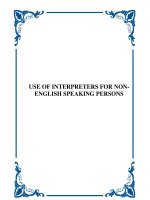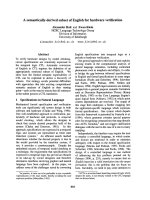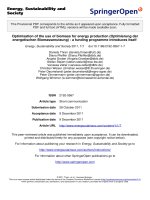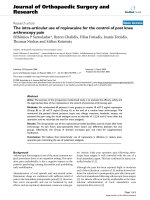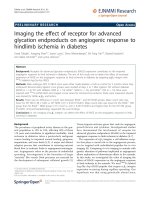USE OF ENGLISH FOR ADVANCED LEARNERS 07
Bạn đang xem bản rút gọn của tài liệu. Xem và tải ngay bản đầy đủ của tài liệu tại đây (384.51 KB, 2 trang )
<span class='text_page_counter'>(1)</span><div class='page_container' data-page=1>
<b>Thẩm Tâm Vy, 27th<sub>, 2020 USE OF ENGLISH FOR ADVANCED LEARNERS - 07 </sub></b>
<b>USE OF ENGLISH ~ 08</b>
<b>FOR ADVANCED LEARNERS </b>
<b>FORMINg NEW WORDS </b>
<b>I.Write a word from the list below in each gap to complete the text.</b>
<b>bypasses ■ congestion ■ infrastructure ■ junctions ■ links ■ queues ■ ring </b>
COMMUTING
When we think of commuters, we often imagine people walking to the station in a
leafy suburb and taking the train into the city. That was how commuting began, and the
train is certainly still a good way of avoiding (1)...on our roads.However, many
people commute long distances by car each day, and it is not uncommon for drivers to
have to sit in (2)...of traffic for hours. The (3)...of a country determines how
pleasant or otherwise your daily commute is going to be.(4)...roads or (5)...
(avoiding the towns that we used to have to drive through) all help, as do good rail
(6)..., butroadworks, accidents, traffic lights and busy (7)...can all cause delays
and add to the journey time.
<b>II. Read the sentences and guess the meanings of the prefixes in bold</b>.
1. According to the weather forecast, travelling conditions will be hazardous in the
early hours tomorrow.
The horse-drawn cab was the forerunner of the taxis that are so familiar today.
2. Most large cities in the rush hour are synonymous with congestion.
The trains in both directions are carefully synchronised so that they don’t arrive at the
station at the same time.
3. The station terminal was a large round building, over 200 metres in circumference.
The transport authority was found to have circumvented the safety rules, putting
passengers’ lives in danger.
4. The letter had a postscript telling me there was a voucher attached that I could use on
any train in the next three months.
The match was postponed because of the rail strikes.
<b>III. Look again at the roots of the words in Exercise II and try to guess the </b>
<b>meanings of the parts in bold below. </b>
1. forecast <b>... </b> 2. forerunner <b>... </b>
3. synonymous <b>... </b> 4. synchronised <b>... </b>
5. circumference <b>... </b> 6. postscript <b>... </b>
<b>IV. Match the prefixes with their meanings. </b>
1. pre- a. between or among
2. fore- b. against
3. counter- c. first
4. trans- d. across or change
5. inter- e. before or ahead of time
<b>V. Write a form of the word in brackets together with a prefix from Exercise IV in </b>
<b>each gap to complete the text. </b>
Commuting is defined as travelling back and forth regularly. However, it is (1)...
(<i><b>dominate</b></i>) linked to travelling for work. A hundred years ago, no one could have (2)
<b>...(</b><i><b>tell</b></i>) how many commuters there would be today. Yet sometimes it seems that the
advances we have made in transport networks and motor vehicles have been (3)...
(<i><b>produce</b></i>), since all we do is sit in traffic jams. This is a shame, because governments
and construction companies do great work, only to find that the (4)...(<i><b>form</b></i>) they had
hoped for has not happened. One reason is that the different means of transport are
(5)...(<i><b>depend</b></i>), which means that a new system relies on other systems working
alongside it. It’s no use, for example, having a great urban rail system if all the roads
leading to the stations are at a standstill.
<b>VI. Choose what each group of words has in common. Write a form of one of the </b>
<b>words in each gap to complete the sentences. </b>
<b>1. audience, audible, auditorium, audiovisual, audition </b>
They are related to...
a. hearing. <b>b. speaking. </b> <b>c. thinking. </b>
We didn’t hear the last call for our train - those station announcements are
completely..., aren’t they?
<b>2. automobile, automatic, autograph, autonomous, autoimmune </b>
They refer to...
a. speed. <b>b. something done by itself. </b> <b>c. something modern. </b>
Stand clear of the doors. They open...
<b>3. benefit, benefactor, beneficial, benevolent, beneficiary </b>
They refer to something...
a. good. <b>b. bad. </b> <b>c. dangerous. </b>
The main...of the new light railway will be workers who live in the western
suburbs.
<b>4. proceed, precede, recede, exceed, succeed </b>
They are related to...
a. winning. <b>b. stopping. </b> <b>c. going or moving. </b>
The driver was fined €100 for...the speed limit.
<b>5. predict, verdict, dictionary, dictate, diction </b>
They are related to...
a. studying. <b>b. writing. </b> <b>c. speaking. </b>
Snow is...overnight, so drivers should expect delays in the morning rush hour.
<b>VII. Write a form of the word in capitals in each gap. </b>
1. We gathered in the large...to hear the plans for the new rail link. <b>AUDIENCE</b>
2. The roads were closed to allow the...through the town. <b>PROCEED</b>
3. The traffic made me late for work three days in... <b>SUCCEED</b>
4. There was little in the way of infrastructure when the...
</div>
<span class='text_page_counter'>(2)</span><div class='page_container' data-page=2>
<b>Thẩm Tâm Vy, 27th<sub>, 2020 USE OF ENGLISH FOR ADVANCED LEARNERS - 07 </sub></b>
5. As the bus driverwas..., he drove into a parked car. <b>REVERT</b>
6. The damage to the bridge in the earthquake could not have been... <b>SEE</b>
7. I remember...my first commute into the city after I passed my driving
test. <b>DREAD</b>
8. I’m so sorry I didn’t pick you up this morning. It was a terrible...
on my part. <b>SEE</b>
9. I was driving to work in my..., which was fine until it started raining on
the motorway. <b>CONVERT</b>
<b>VIII. Match each group of words with its group meaning. </b>
<b>1. credible, incredible, incredulous, credit, credential, credulity ... a. bend </b>
<b>2. attract, tractor, traction, extract, retract, subtract, protract, contract ... b. close </b>
<b>3. include, exclude, claustrophobia, enclose, exclusive, reclusive, recluse ... c. believe </b>
<b>4. evolve, revolve, devolve, evolution, evolutionary, evolutionist ... d. write </b>
<b>5. flexible, reflection, deflect, flex, reflex, inflexibility, reflective ... e. pull or take </b>
<b>6. graphic, polygraph, biography, graphite, autograph ... f. turn or roll </b>
<b>IX. Write the correct word in each gap. </b>
1. withheld / upheld
a. The development committee...vital information from the public.
b. If the traffic police...the law, there would be fewer accidents.
2. likewise / clockwise
a. Most people are using the underground today and we suggest you do...
b. Go around the ring road in a...direction until you see a sign for Paignton.
3. painful / painstaking
a. He gave me the directions in such...detail that I couldn’t follow them.
b. Falling off my bike was an extremely...experience.
4. bystanders / bypasses
a. It wasn’t the accident that slowed down the traffic but the number of...on the road.
b. The construction of two new...will mean that lorries will not need to go through
the town centre.
5. caution / precaution
a. I always carry a petrol can as a..., just in case I run out.
b. Due to high winds, drivers are urged to exercise...in exposed areas.
</div>
<!--links-->
